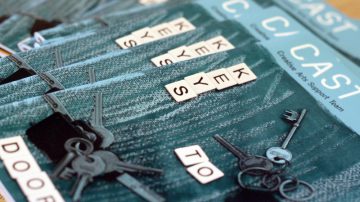During lockdown I started walking round my local park every day. Once we were allowed to meet with someone else outside, I often met friends for a walk in the park too. I found this daily walk so beneficial to my wellbeing that I’ve made it part of my daily routine to walk in the park every morning.
In recent months Park Run has started up again, so on Saturdays I found that I need to either share the park with about 400 runners or I need to walk elsewhere. Today I chose the park.
I was there before the runners so I saw the marshals setting things up, then watched and listened as they supported the runners. It occurred to me that we could all do with one of those marshals in our minds as we navigate our mental wellbeing.
I noticed that the marshals had three main jobs: to make sure everyone was safe, to mark out the way ahead, and to encourage the runners on their way. When my mental health is out of balance I know I could definitely do with someone like that in my life! But, while we undoubtedly need others to give and receive support, could we do some of these things for ourselves?
Safety
It seems like everything and everyone needs a risk assessment, especially since Covid arrived on the scene. I’ve certainly had a number of risk assessments done to me over the last couple of decades. But rather than being done to, how would it be to create our own risk assessment? Why shouldn’t we jump on the bandwagon on our own behalf?
Before Park Run ever began, there would have had to be a risk assessment. This means thinking of all the things that could possibly go wrong and coming up with an action to deal with them if they happen. We work backwards from the thing that could make us unsafe to put in place some things to do if that situation occurs. If we have a plan of action prepared for the things that worry us, we can be a bit less worried.
So what makes you unsafe, and how could you avoid or deal with that?
For me, it’s a combination of things I can do for myself and things where I need others to help and support me. Something that makes a big difference for me is knowing my triggers and warning signs. I can’t always avoid those triggers, but if I have to deal with one I can often think about it ahead of time and figure out what I and others can do to support me through it. It’s up to me to identify the trigger or early warning sign, but sometimes I can’t be the only person to try to deal with it. That means I have to be honest with myself and those I trust about how I am, and be aware of what they can do to help, and, importantly, what they can’t do. At that point we need a different solution. If we can think about these things in advance and draw on our experience of what does and doesn’t help, we can be more confident that we can get through even the hardest of times, together.
Marking the way ahead
The second activity our inner marshal needs to take care of is marking the way ahead. The marshals in the park are there well before the runners turn up, putting out flags and markers. Then, during the run, they stand at the points where the paths diverge to make it super clear which way the runners need to go. This is probably in their risk assessment, because people moving at speed in different directions have a tendency to crash into each other!
More than that, though, I have it on good authority, from those who are crazy enough to embark on this running lark, that when you run, it’s really important to keep your head up and look towards the horizon. That way, you can pace yourself, because you can see the ups and downs ahead. The temptation is to put your head down and just run through the pain, but actually keeping your head up makes the run easier. The marshals help with this, standing on the corners in their high vis jackets, a visual focus marking out the way ahead.
Of course, none of us can know the future, and at times we have to deal with the unexpected. However, many things can be assumed. For example, unless something unexpected happens, I can be fairly certain that I’ll be back walking in the park tomorrow morning, and the morning after that, and the morning after that. Looking ahead like this, I can see that if I want to do this thing that really helps with my wellbeing, I’ll need to get up at a reasonable time in order to fit my walk in. I’ll need to be aware of how long I’m out there and whether I have time to do a particular loop or not. I’ll be able to predict that, however I feel before I set out, I will feel somewhat better by the time I get home. I’ll be able to pace myself because I have a good idea of what I’m expecting myself to achieve.
If, instead of keeping my head up and looking ahead, I look backwards at where I’ve been, I will need to stop walking, because I won’t be able to focus on what’s in front of me. If I run forwards but I keep looking behind me, I’m liable to crash. Similarly, if I keep looking backwards at the past, I’ll need to do so in a still and safe space. Then I need to leave the backward glances in that place and start looking ahead again. Getting through life, like ploughing through a difficult run, goes much more smoothly if we can keep our heads up and look at what’s on the horizon. We can pace ourselves, plan for what’s ahead, and avoid crashing by shifting our focus out of the past and into the present.
None of this is easy, but, as with physical fitness, we strengthen our mental muscles by practicing these things and gradually building up our strength and endurance, until we can keep looking up and taking a clear-eyed view of what’s ahead.
Encouragement along the way
The third thing I noticed the marshals doing was one that makes a huge difference. They encouraged the runners, telling them how well they were doing, congratulating them on getting up the hills, praising their determination and effort. As I walked round one of the corners the marshal there even gave me, a mere walker, some encouragement. “Good walking, well done!”, he said to me. I laughed and told him I do it every day. He said, “That’s great dedication, good for you!” It really put a smile on my face, and I remembered how unfit I was when I started these daily walks and how far I’ve come.
Our inner marshal needs to be as supportive and encouraging as this man was to me. Initially I found it funny, I didn’t think I was doing anything out of the ordinary, so why was he praising me? It can feel a bit false at first when we try to change our internal dialogue from diatribe to delight. But actually, whether or not my walking was anything to celebrate, what he said made me smile and feel good. The things others say can really make a difference. The things we say to ourselves, even more so. So let’s say to ourselves things like “That’s good pot washing. Well done!” Or “You’ve shown real commitment to today by getting out of bed! Way to go!” If nothing else, it might make us smile.
Bit by bit, we can learn to find, listen to and love that inner marshal. Perhaps in doing so we might learn to listen to, love and take care of ourselves more.



